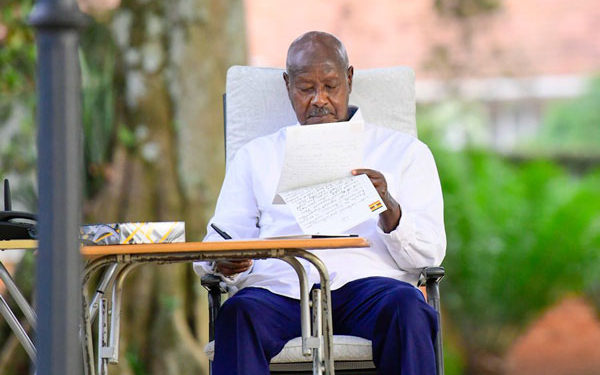By CHANGE OF GUARDS
On April 8, traders in Kampala city went on a sit-down strike protesting high taxes, unfair competition, and inhumane enforcement of tax compliance. They further complained about the preferential treatment accorded to Chinese, Indian, and other foreign traders, as well as the militarization of tax enforcement. The strike threatened to spread to other urban centers in the country. Kampala city generates almost 80% of the national income, and any such disruption would gravely affect the national economy. Attempts by the concerned authorities to convince the traders to reopen their shops were unsuccessful. What scared Museveni most is the fact that the list of grievances included poor service delivery and infrastructure breakdown in the city amidst extravagance by the regime.
Worried that the backing of the strike by the general public could spark off the much-anticipated mass protests against the government, Museveni deployed the army on the streets. Indeed, attempts to start mass protests were violently nipped in the bud. For him, this was an opposition-inspired insurrection aiming at bringing down his regime. Actually, behind the scenes, the entire security apparatus was on standby, class one ready to swing into action. He had been receiving hourly updates of intelligence briefings about the development and was made aware of the details of each and every grievance of the striking traders. He had held several rounds of meetings with technocrats over the same matter.
The Minister of Finance, the Minister of Trade, the Commissioner General of URA, the Minister of Kampala, the Executive Director of KCCA, the RCC Kampala City, the Private Sector Foundation Uganda, the National Chamber of Commerce, and all other authorities could not resolve the matter. On April 19, Museveni met the representatives of the traders at State House and, as usual, subjected them to intimidation and blackmail. Out of fear, they couldn’t dare raise the issue of poor service delivery and extravagance by the government. Museveni duped them into opening their shops by suspending the imposition of draconian penalties. He promised them further consultation on May 7 after he would have met with the technocrats on May 24. Later, he issued a statement on social media:
“I have asked the traders to give me time to research more and consult the technocrats on all concerns they raised. It’s good they have agreed to open up their businesses as we continue to find solutions to issues raised. I will then meet them on May 7, 2024, at Kololo and discuss further.”
Indeed, on April 20, 2024, the gullible traders resumed their businesses in the hope that their grievances were being addressed. They forgot that this was not the first time they were striking and meeting Museveni, who makes empty promises to them. They ought to have interrogated why the unfairness in tax administration only affects Kampala city and a few other urban centers in the same region. The strike ended, and the visible military deployment was pulled back, but the plainclothes intelligence personnel are still fully active. Museveni needs no consultation with the technocrats because he had exhausted their input before meeting the traders. Maybe for him to brief them on how to further suppress the traders to never repeat the attempted coup. If his May 7 meeting with the traders takes place, it will just be a lecture characterized by blackmail and intimidation, accusing them of being agents of western imperialism and economic saboteurs.
INFORMATION IS POWER AND THE PROBLEM OF UGANDA IS MUSEVENISM







Discussion about this post